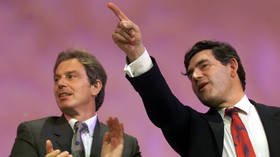No mention of Brexit? New BBC doc on Blair & Brown shamefully ignores their REAL lasting legacy

The achievements of former British prime ministers Tony Blair and Gordon Brown are examined forensically in a new BBC TV series. But its failure to acknowledge them as arguably the major cause of Brexit is a massive oversight.
A new BBC documentary, ‘Blair and Brown: The New Labour Revolution’, has landed on iPlayer. It’s a five-part series, which sheds some light on the relationship between Blair and Brown, the two most powerful men in the British government between 1997 and 2010.
I would argue that there are few governments in British history that have left a lasting legacy. The post-war Labour government of Clement Attlee and Margaret Thatcher’s Tory government of the 1980s are two that spring immediately to mind.
Yet, there can be no doubt that the Blair and Brown governments did too. Labour swept to power in 1997 with a huge majority of 179 seats, one of the largest of the 20th century.
It was the time of Britpop and Cool Britannia, and the country now had a young and dynamic PM in Blair, who symbolised the new era.
The documentary, however, begins years before those heady days and initially focuses on how the young Blair and Brown set about reshaping and rebranding the Labour Party.
It reveals that whereas Brown lived and breathed politics from his student days, Blair was apolitical until he had what he calls an “epiphany” when visiting the Palace of Westminster.
It must be said that Blair and Brown would never have risen to the top of Labour if it hadn’t been for the political failure of the party in the 1980s and early 1990s. Michael Foot and Neil Kinnock lost three elections in a row for Labour, and then John Smith had a heart attack and died in May 1994.
Also on rt.com France’s political right is tearing itself apart and could be handing unloved Macron the keys to the Elysee for another four yearsFrom the ashes of defeat and then death rose Blair and Brown, but it was far from a smooth transition. Brown, as the senior partner, believed he was the rightful heir to Smith. Blair, however, inspired by Bill Clinton, thought his time had come.
What happened next has entered political folklore and revealed Blair’s naked ambition, self-belief, and later, according to the supporters of Brown, his duplicity.
According to Brown, the two came to an agreement whereby Blair would stand aside from the leadership and hand over the reins towards the end of a second term as prime minister, should Labour be elected. Blair seems to acknowledge that there was an agreement but offers no time scale. Brown’s big mistake, in hindsight, was never having the agreement put in writing.
With Blair as leader, gone were commitments to tax and spend, nuclear disarmament and the policy to leave the European Union. In was economic prudence, law and order and “education, education, education.”
Blair’s Labour Party romped home in 1997, defeating a Tory party drenched in sleaze, and he became PM and Brown the chancellor of the exchequer. However, the wheels quickly came off, as the government was dysfunctional from the start. As Blair’s spin doctor Peter Mandelson said, “there were two centres of power” or “two camps” as he described it.
Ed Balls, who was Brown’s advisor, said his man “wanted a partnership” where “economic and social policy was his domain.” He would, in effect, be the most powerful chancellor in history. With Brown focused solely on domestic issues, Blair was left with a free hand in international affairs, which eventually had catastrophic consequences.
Blair’s spin-doctors briefed that Brown was “psychologically flawed.” Brown’s people revelled in the fall of Mandelson, which Blair called “the product of internal nonsense.”
Also on rt.com This week’s elections could pave way for Prague to Czech out of EUOften, when there are leadership disputes in politics, it is the underlings – who believe that they are performing their masters’ wishes – who act in an underhand manner. Blair and Brown introduced this poison into politics, and it still prevails today.
The reality, however, was that the arrangement was never going to work. Indeed, British political history proves that dual leaderships always fail, as there can only be one leader.
There were certainly occasions that the country should be thankful that Brown was such a powerful chancellor. When Blair’s freedom on the international stage trampled on Brown’s economic turf, there was a clash, and none more so than over the euro. Whereas Blair was eager for the UK to join the currency, Brown, with some foresight, believed that it would lead to a recession. Time would show that Brown, and not Blair, was right on this issue.
One of the questions that is often asked of Blair is was he ever a real Labour politician? It is telling that when those who were around him as PM were asked, few could give an answer. What becomes clear during the documentary is that Blair was a clean break with Labour’s past. He had no ideological base and was prepared to embrace certain aspects of Thatcherism.
Brown, however, was cut from more traditionalist cloth and more prepared to embrace Labour’s past. As Mandelson said, “Tony was more New, Gordon was more Labour.”
The best example of this came with their attitude towards the National Health Service (NHS). Whereas Blair was relaxed about allowing part-privatisation of the NHS, Brown was stridently opposed.
Brown hung like a ball and chain around the neck of Blair, but he was too powerful to sack. Although Blair considered it in 2001, it was decided that Brown would be more dangerous outside government than in it.
Even by this point, Brown was getting itchy feet. As far as he and his allies were concerned, time was up, and Blair had to fulfil his part of the 1994 agreement and stand aside. As John Reid, the former home secretary, said, “The prince couldn’t wait for the king to die.”
Also on rt.com Greta is favourite to win the Nobel Peace Prize because, bafflingly, our elites are still in thrall to this child prophet of doomHowever, before Brown did take over, Blair soiled his own legacy, and for a politician who liked to strut on the international stage, it was fitting that it was foreign policy which was his undoing.
Blair’s determination to follow George W. Bush into Iraq, regardless of the lack of evidence of weapons of mass destruction, led to a collapse in his support.
According to the documentary, Brown said nothing about the decision to go to war in Iraq, although he now claims that he did not get the information he asked for.
Following the Iraq war, Blair’s reputation was never the same. Gone were the heady days of hope and the idea that “things can only get better.” Instead, there was now a war-weary PM attempting to defend what seemed to be the indefensible, and Brown was determined to force a timetable for a transfer of power.
Even today Blair is not remorseful about Iraq. Indeed, during the documentary, he continues to maintain that the invasion of Iraq was the right thing to do, regardless of all evidence to the contrary. But, of course, it’s okay for Blair – he has since made a fortune advising despots around the world and squirreling away millions of pounds in his bank accounts.
When Brown eventually did take over in June 2007, it was a bitter-sweet affair. He achieved his ultimate ambition of being PM, only to find that he wasn’t very good at it. It was a Shakespearian tragedy writ large.
However, whereas some of Brown’s problems were self-inflicted, such as his dithering over calling a general election in 2007, others were out of his control, like the banking crisis. Nevertheless, Brown was eventually kicked out of office in 2010, bringing to an end 13 years of the New Labour experiment in government.
Also on rt.com Western fears over Balkan states could spell the end of the EU’s dream of an ever-expanding empireAnd what is their legacy? Well, interestingly – or conveniently – the BBC documentary did not mention their biggest and most lasting legacy, which is demographic change. The Britain of 1997 was unrecognisable to the Britain of 2010.
It is beyond doubt that Blair and Brown altered Britain forever, because unlike the economic policies of Attlee and Thatcher, the demographic changes they oversaw are irreversible. Indeed, Blair says in the documentary that progressives only win “when they own the future,” but he proved that they also win when they purposely don’t tell the public what the future holds.
Now, whether you think that mass immigration in the Blair and Brown years was a good thing or not, I am sure we can agree that they had an obligation to tell the electorate what they were planning. It is to their shame that they failed to do this.
I think the whole Blair and Brown era can be summed by another incident the documentary conveniently omitted – when Brown was caught calling a pensioner, who raised the issue of immigration with him in 2010, “a bigoted woman.”
At that moment, his premiership was finished, and New Labour was consigned to the dustbin of history. Moreover, it revealed what we all suspected: Labour looked down its nose at working-class people, and it does even more so now, especially if you voted for Brexit.
Think your friends would be interested? Share this story!
The statements, views and opinions expressed in this column are solely those of the author and do not necessarily represent those of RT.














